Search here
Newspaper
Search here

Arab Canada News
News

Published: March 27, 2024
Hamas-affiliated media quoted Political Bureau member Ezzat al-Rashq as saying that the movement does not trust Israel's announcement of the assassination of the deputy commander of the Al-Qassam Brigades, Marwan Issa.
Al-Rashq said, "There is no trust in the occupation's narrative about the assassination of the brother, the mujahid commander Marwan Issa... The final word is for the Al-Qassam Brigades."
He added that "the timing of the occupation's re-announcement of the assassination of Marwan Issa is to cover up the crises facing Netanyahu and the failure of the occupation army to achieve its goals."
However, al-Rashq, who is considered one of the prominent leaders in the movement's Political Bureau, did not provide the movement's account of Marwan Issa's status, whether by denial or confirmation.
Hamas leader Osama Hamdan said: "We have not received confirmation from Al-Qassam leaders regarding the killing of Marwan Issa."
Statements by al-Rashq and Hamdan indicate a crisis in communication with field commanders and the difficulty in extracting information from the field in Gaza, where reports of Issa's assassination appeared two weeks ago.
Hamas' statements come in response to the announcement by Daniel Hagari, the Israeli army spokesman, on Tuesday, saying that Israel eliminated the deputy military commander of Hamas in Gaza, Marwan Issa.
Hagari clarified that the assassination operation of Marwan Issa took place two weeks ago in the Nuseirat Camp.
Earlier, the British Guardian newspaper mentioned that the Israeli airstrike that killed Marwan Issa targeted a tunnel complex under the Nuseirat refugee camp in central Gaza a week ago.
According to the report, communication systems among Hamas leaders, which rely on encrypted applications and couriers, were disrupted for more than 72 hours after the attack on Issa, which usually happens whenever senior Hamas leaders are assassinated.
The Guardian consulted experts who said that the strike targeting Issa, a prominent figure in coordinating the October 7 attack by Hamas on Israel, indicates that Israel is receiving intelligence from a prominent source within the organization.
Avi Melamed, a former Israeli intelligence official and regional analyst, told The Guardian that Israel’s success in carrying out the operation required prior knowledge of Issa’s precise location and timing of his presence there, ensuring enough time for government approval and execution by the Israeli army.
Moreover, Israel had to ensure that Israeli hostages were not used as human shields near him, a detail likely confirmed through a human informant, according to Melamed.
Issa is among the most important targets that have been targeted since the beginning of the war and is considered the third man on Israel’s wanted list within Hamas, after Mohamed Deif, the commander of the Al-Qassam Brigades, and Yahya Sinwar, Hamas leader in Gaza.
The fourth was Saleh al-Arouri, whom Israel already assassinated in Lebanon a few weeks ago.
Comments